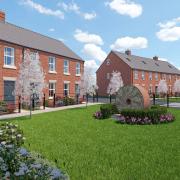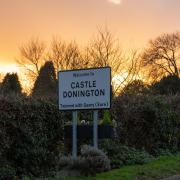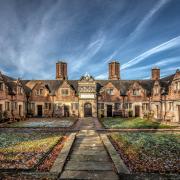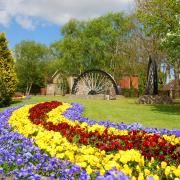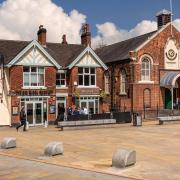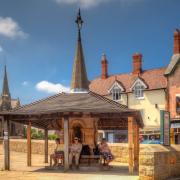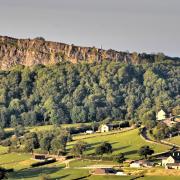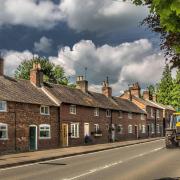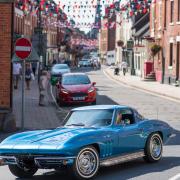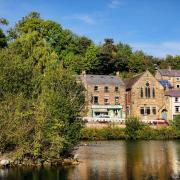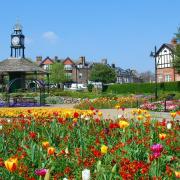Mike Smith visits one of the county’s best bookstores and cafés en route to the charming remote village of Earl Sterndale and its glorious surroundings in the Upper Dove Valley.

The well-known bookstore at Brierlow Bar, near Buxton, was established 18 years ago by David McPhie in a former repair garage, car showroom and filling station. Located at the junction between the A515 Buxton-Ashbourne road and the B5053 road to Longnor, this book-browsing heaven has become one of the most popular destinations in the Peak District, especially since one section of the premises was converted into a café, without any apparent reduction in the number of books on sale.
The addition of the café was an initiative taken by David McPhie's daughter Louisa, who took over the management of the bookstore on her father's semi-retirement in 2016. A further bonus was the construction, one year later, of a new kitchen, enabling the café, managed by Louisa's friend Lisa Hutchinson, to begin adding lunchtime meals to an already impressive range of home-cooked food. It was also Louisa's decision to change the name of the bookstore from Brierlow Bar Bookshop to High Peak Bookstore and Café, 'to more accurately define the broader geographical and cultural position our customers recognise we occupy.'
Louisa's father continues to make an important contribution to the bookstore by presenting a series of interviews and performances on the second Friday of each month, covering subjects that have interested him for most of his life, particularly natural history, railways, cricket, football and music, ranging from jazz, blues and folk to country, rock 'n' roll and soul.
Bookstore manager Liz Mycock said: 'We stock over 40,000 books, arranged in 50 different categories, making the store one of the largest independent bookshops in the country. Because 95 per cent of our books are 'remainders', we can sell them at less than half their original price. We also have an unrivalled collection of books about the local area and we have a dedicated children's section, which is decorated like a jungle. We sell bird food and we have a large and eclectic selection of greeting cards, making the sales of our cards second only in number to the sales of our fiction titles.'

A large illustration attached to the front of Liz's serving desk is a striking image of a conical limestone formation backed by a steep hill that towers above it. Although the photograph looks as if it could have been taken in the Italian Dolomites, it was actually taken just a couple of miles from the store, where a remarkable Lilliputian version of Alpine scenery is to be found. Seen from the nearby village of Earl Sterndale, the two most prominent peaks, Chrome Hill and Parkhouse Hill, have profiles that resemble a dragon's back. They stand face-to-face like stegosauruses engaged in a stand-off before taking part in mortal conflict.
As if cowered by the overwhelming presence of these two distinctive hills, Earl Sterndale is an unassuming village. However, the peace of the remote settlement was shattered in the Second World War, when the Church of St Michael and All Angels became the only Derbyshire church to be destroyed by enemy action. Apparently, the pilot of a German bomber had mistaken the building for a large munitions depot at nearby Harpur Hill. The church was not fully repaired and re-opened until 1952, when its Saxon font was also restored.
This catastrophic event is commemorated in a verse penned by local poet Tom Wise: 'They bombed our church them Germans did/ In nineteen forty one/ And left it there without a lid/ Exposed to wind and sun/ And when at last the war was o'er/ And Hitler was the loser/ We knelt, praying as of yore/ Thanked God they missed the boozer.'
The local pub referenced in the poem is an ancient village inn called The Quiet Woman. Legend has it that a landlord of the pub in times gone by was nagged so relentlessly by his wife, known as 'Chattering Charteris', that he silenced her by cutting off her head with an axe. It is even said that the villagers were so relieved when they found she had been silenced that they held a collection to pay for the headstone on her grave.

The current long-serving landlord, Kenneth Mellor, keeps customers amused with plenty of tall stories of his own. He also lights a coal fire for their comfort on every day throughout the year and provides skittles, darts and pool for their entertainment. On the other hand, his food offerings are limited to a wrapped Wright's pie, a packet of crisps and a pickled egg. As one visitor commented, 'This is a proper old-fashioned pub with good real ale at a decent price - and the landlord is splendid.' Reinforcing this assessment, another visitor said: 'The Quiet Woman is a real honest, no frills country pub. If you want posh, don't bother. This is a pub with no pretentions.'
Landlady Jennifer Mellor told me that an upstairs room at the pub had been used as a classroom many years ago. She also said that the splendid sycamore tree on the village green had been planted to commemorate the coronation of Edward VII and Queen Alexandra. This large tree and the adjacent red telephone box and post box at the centre of the settlement make a splendid set piece, as does the duck pond located just beyond the boundary sign. The cottages and farmhouses located in the village date from many different periods, with some of them being very pretty.
The village school, occupying a building that was constructed in 1850 and extended in 1895, can accommodate 35 pupils. Headteacher Daniel Holden is clearly delighted to work in a school which, as the most recent Ofsted inspection commented, 'is extremely popular within the community' and is a place where the parents and families of the children 'appreciate the tremendous care, guidance and support that they and their children receive.' Daniel said the Ofsted inspector had told him that she had never visited a school before where the questionnaires sent to parents had received a 100 per cent response and where every response had been totally positive.
Music is a strong feature of the children's learning, with every child being provided with the opportunity to play a musical instrument. And, given the rural location of the school, it is not surprising to find lots of opportunities for the children to benefit from outdoor activities, including climbing, walking and canoeing. Daniel said, 'Recently, we hired a mobile climbing wall so that we could host the first climbing festival held for a group of small schools in the local area. Every Monday morning, we begin the school week with all the children being taken on a walk up a nearby hill and back down again, rather like the troops of the Grand Old Duke of York.'
Visitors to the local area are tempted with some rather more challenging hill walks in the form of ascents of Chrome and Parkhouse Hills, two distinctive coral-reef knolls that were formed 330 million years ago in the waters of what was then a tropical sea. In a recent travel feature in The Guardian, walks to the summits of the two hills were selected as quieter alternatives to the better-known ascents of Mam Tor and the Great Ridge, with equally rewarding scenery as a bonus.
In the words of The Guardian's correspondent, Carey Davies, 'Chrome Hill and Parkhouse Hill are what might happen if you took a pair of Alpine mountains, shrunk them to about a 20th of the size, and plonked them amid the green pastures of the White Peak.'




